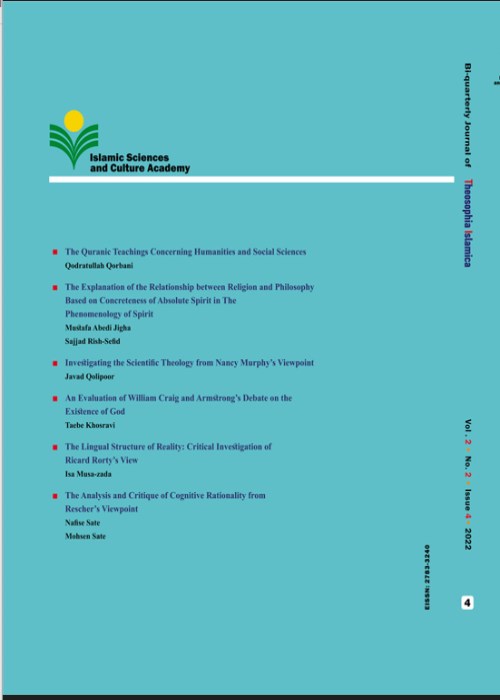The Explanation of the Relationship between Religi
According to The Phenomenology of Spirit, the religion and philosophy are considered as important stages of the history of consciousness, and the absolute spirit is to become self-conscious of itself, as spirit, in the process of genesis of these two stages. The central issue of the present article is answering the following questions: ìWhat relationship does Hegel establish between delicacies of religion and philosophy?î ìAre religion and philosophy considered, in his thought, as double truths for each of which separate realms exist or these two are different stages of one single truth that express the spiritís self-consciousness of itself in two stages?î To answer these questions, the writer attempts to show, through a descriptive-analytical method, how Hegel offers a theoretical explanation for substituting the image of national and ethnic religion for its traditional image by making the absolute affair to the ethnic spirit. Besides, it shows how Hegel ñ unlike the transcendental philosophy and exalted philosophy ñ on the one hand turns God and absolute spirit from non-understandable ideas to cognitive and conceptual ones, and on the other hand, removes ñ in this way ñ the duality of the realm between religion and philosophy and establishes an internal relationship between them. Through creating a dialectic relationship between religion and philosophy, he finds the possibility to remove the contrast between the myth and the realm of systematic knowledge. And by making it close to the framework of system of knowledge, he introduces the myth not in contrast to rational knowledge, but as the outset of the way whose truth the rational knowledge is going to explain.
religion , philosophy , ethnic religion , God , double truth
-
Medina Farabi's political security and its emphasis on the logic of virtue
Jigheh *, Abolfazl Kavandi Kateb, Hossein Mahjobi Manesh
Journal of The History of Islamic Philosophy, -
Fichte's effect of Machiavelli's effective reality in politics and overcoming it in the moral sphere
Jige *
Qarbshenasi-ye Bonyadi,



